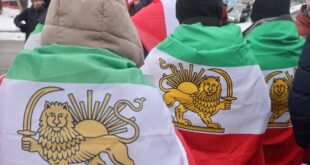 TEHRAN (Fars News Agency)- Russian Foreign Minister Sergei Lavrov said six-party talks on Iran’s nuclear program would take place on Tuesday, swiftly reversing an earlier statement that the talks had been delayed.
TEHRAN (Fars News Agency)- Russian Foreign Minister Sergei Lavrov said six-party talks on Iran’s nuclear program would take place on Tuesday, swiftly reversing an earlier statement that the talks had been delayed.
Lavrov’s rapid volte-face appeared to be a further sign of the difficulties which international powers are having in finding common positions in response to Iran’s defiance of the West.
Lavrov said the talks were back on when he landed in Moscow after a trip to Jordan for a conference also attended by US Secretary of State Condoleezza Rice and foreign ministers from Britain and Germany.
“As a result of .. efforts including those undertaken by Russia the meeting of political directors of the six on Iran will take place on Tuesday,” Interfax quoted him as saying.
“We assume that the goal of the document won’t be striving to punish Iran,” Lavrov said, referring to draft sanctions against Iran being discussed in the UN Security Council.
Lavrov had initially said the talks had been delayed because of differences with Western partners.
The United States, China, Russia, Britain, France and Germany are trying to narrow their differences on Iran.
Russia and the Western partners have clashed repeatedly over a Security Council resolution with Russia making every effort to avoid any strong sanctions, which it believes would push Tehran into corner and make things worse.
French Foreign ministry spokesman Jean-Baptiste Mattei made clear that the Tuesday meeting was not finalized.
“A meeting of the political directors of the six on Iran is being considered for the start of next week. Contacts are continuing to define the date and the location,” he said.
The United States and the European drafters of the document, Britain, France and Germany, want the 15-member Security Council to impose sanctions on Iran’s nuclear and ballistic missile programs after it refused to suspend its uranium enrichment activities, as demanded by the US and EU3 (Britain, Germany and France).
But Russia, backed by China, has chopped off close to half of the original European text.
The West alleges Iran’s uranium enrichment work is a cover for bomb-making, while Tehran vehemently rejects such allegations, saying that it is merely for generating electricity.
A new European proposal, drawn up by France, would ban exports to Iran only of the most dangerous items that could be used to make a nuclear weapon or ballistic missile, according to diplomats familiar with the text.
 Eurasia Press & News
Eurasia Press & News



